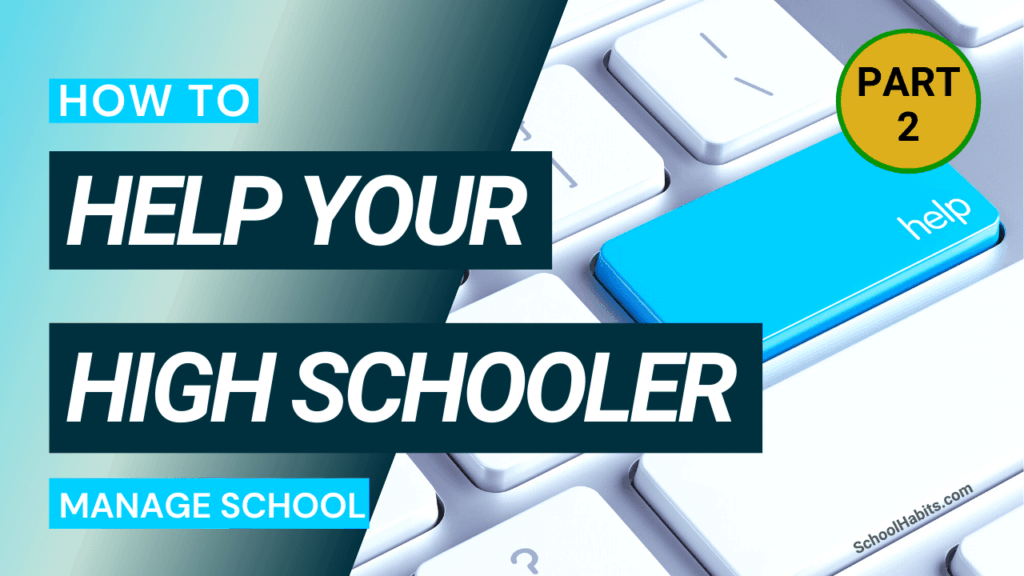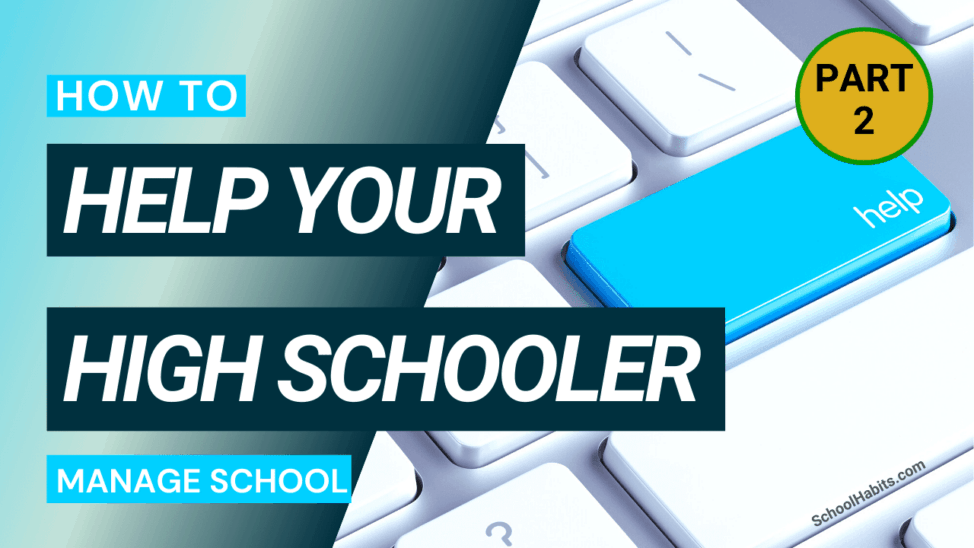
By Katie Azevedo, M.Ed.
This is Part 2 of a series about how parents can help their child manage high school. Read Part 1.
As I discussed in Part 1, parents of high schoolers often struggle to find the balance between helping their child be successful, and setting up their child to be an independent learner.
Remember the golden nugget from part 1: Helping doesn’t mean stepping in at the 11th hour to do your kid’s assignments: helping is about teaching him or her the skills to be an independent learner.
3 more ways that parents of high schoolers can help their child manage school
1. Don’t shame the struggle.
Learning is hard. It’s supposed to be hard. It’s supposed to irritate your brain and make you feel like running in the opposite direction. I wish more people knew this! Somehow the message got out that if our children think something is hard, then there’s something wrong.
This just isn’t so!
Sure, there’s the issue of learning disabilities and ADHD and things like that: I have a Master’s Degree in Special Education, so trust me when I tell you that I understand this caveat.
But the facts are that most people don’t have a learning disability. Most people (without a disability) who struggle with learning have been taught that struggling to understand new material is problematic, and that it’s a warning sign.
No! Learning is SUPPOSED to be hard. It’s supposed to trigger what we call “cognitive agitation,” which is not exactly a warm and fuzzy feeling. But it’s normal and neurologically one of the most important parts of the learning process.
So how can parents use this information to help their child manage high school?
Normalize the struggle. Give them the language to understand that it’s not a warning sign of something going wrong. It’s not an alert that there’s an issue. Don’t shame the struggle. Teach them about it, teach them to expect it, and teach them the skills to learn, acquire and retain information in a way that’s efficient, also known as study skills. These are the exact skills I teach in my video tutorials and private coaching. Your child needs these skills to be successful.
2. Recognize signs of anxiety and overwhelm.
(If your child is experiencing pervasive and prolonged anxiety that interferes with daily functioning, seek a doctor.)
High school is hard. There’s a lot of work. Sometimes there are two tests on the same day, which happens to be on the same day of a big game, which also happens to be the day that another teacher assigns a huge essay.
In other words, your child is going to feel anxious and overwhelmed at times. It’s our job as parents to recognize when our child is feeling overwhelmed and also to give them opportunities to share that information with us. We should teach them the language to talk about anxious feelings and give them the tools to manage these temporary moments.
Teach your child about managing time, prioritizing, writing things down in an external memory system, brain-dumping and avoiding their personal triggers.
One of the most common triggers for anxiety is connected to a feeling of “not enough time to do all the things” – so that’s why teaching these time-management skills is one of the best ways to help your high schooler manage school.
3. Let them teach you something.
Your high school child spends the majority of her day being taught things and told things. She is the object of instruction all day long. This can be exhausting.
Throughout the week, perhaps in car rides or waiting in the dentist’s office, ask your child to teach you something she’s learning. It could be something academic or otherwise, but the point would be for you to listen.
Use active listening strategies such as:
- making eye contact
- putting down your phone
- not interrupting
- not adding an “uh-huh” after each of her pauses
- Keeping your hands still and empty
Ask her open-ended questions such as “tell me more about that” or “what do you think about that?” If she’s talking about something she’s learning in school and you think it’s confusing or boring (the history of the Pythagorean Theorem might not be your thing), act like you’re fascinated. Ask critical questions to encourage her to keep teaching it.
Giving your child the chance to be the teacher for once has a ton of benefits. First, students better process and understand what they’re learning when they talk about it. As she struggles to explain something to you, she’s solidifying the information in her own brain: as she teaches, she learns!
Second, each one of these interactions tells your child that you care. That you’re there. That you’re interested in what she’s interested in. It’s a chance to normalize learning and knowledge-sharing. It’s a chance for you to model active listening skills, intelligent questioning, and critical thinking.
Can you honestly think of a better way to help your child manage high school?

